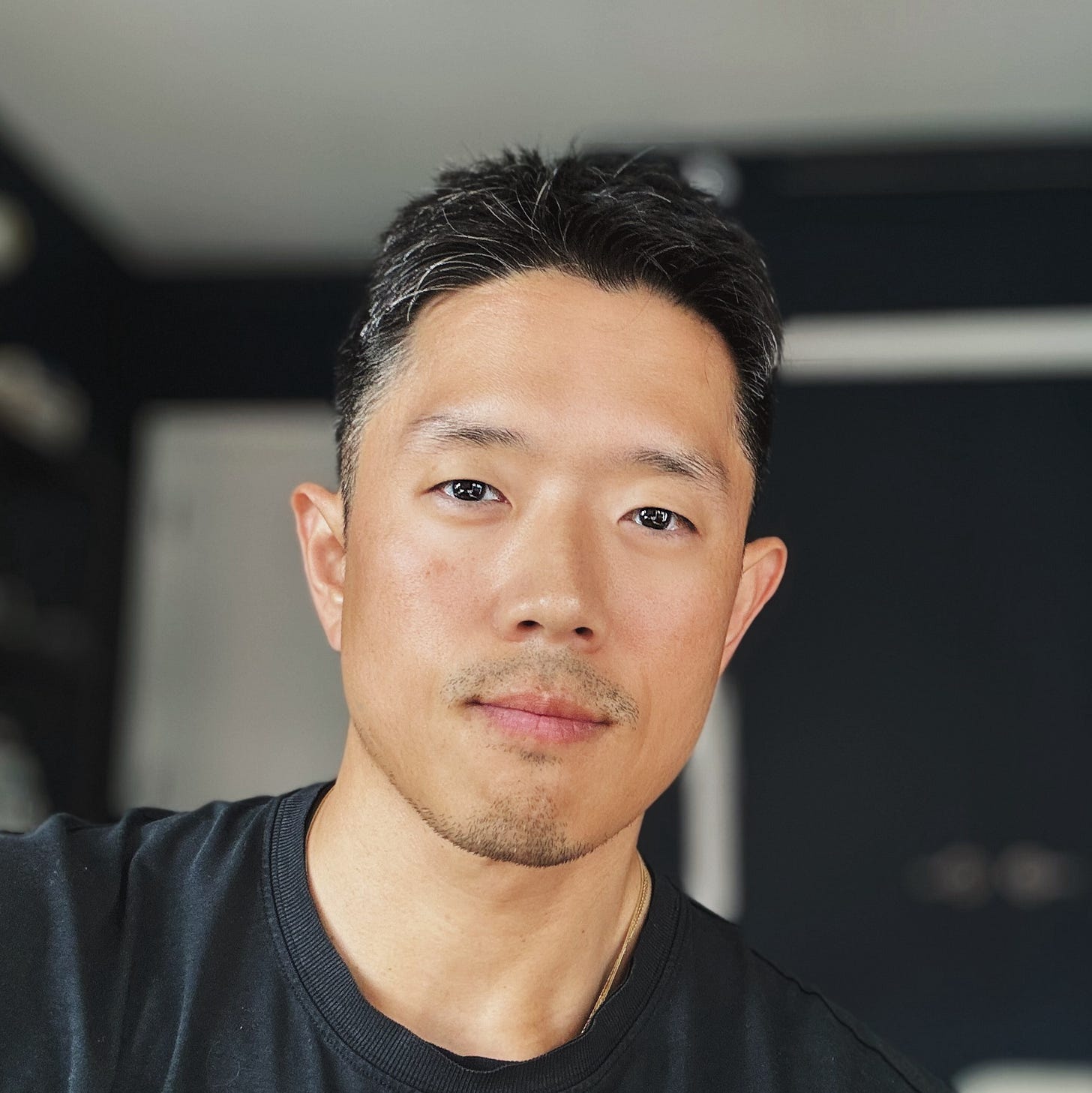Why Campaign Assets Underperform
And more wisdom from Nathan Jun Poekert, Brand Marketing Consultant and former Head of Social at American Eagle.
I first came across Nathan Jun Poekert, brand marketing consultant and former head of social at American Eagle, on LinkedIn. His posts were sharp, thoughtful, and refreshingly honest. Rare for LinkedIn.
When I conduct these newsletter interviews, I typically like to focus them on a specific theme or topic. This one is not that. I trust Nathan’s opinions on this industry and I wanted to ask him all of my questions. Like what the difference between a consultant, freelancer, and advisor is. Or his take on the current state of social media thought leadership on LinkedIn. (Hint: It’s not good.) Or the one thing he wishes he could tell all CMOs.
It’s juicy (“Social playbooks are dead”). It’s informative. And it’s packed with useful takeaways for both social pros and executive leadership. Let’s dive in.
Rachel Karten: First, can you tell me about your current role and any past social (or not!) roles you've had?
Nathan Jun Poekert: I’m currently working as a CMO advisor and brand marketing consultant focused in social media and the creator economy. Soon I am shifting the majority of my time this month to start working with General Idea, an agency in NYC focused in the fashion/retail space.
In the past, I was the Head of Social, Content & Digital Innovation at American Eagle where I spearheaded our organic social practice, organic & paid media content, and innovation areas like Roblox, VR, AR, in-store activations, and partnerships.
Before that I had a traditional marketing role as Global Communications Director at BMW Group and prior to that was on the agency side of things as a Creative Director at Day One Agency and Creative Producer at PHD and Deep Focus.
Have been working in social since 2008 where I was managing MySpace pages for HBO, AMC and Calvin Klein.
RK: Do you have a social media philosophy? A guiding belief that defines how you approach working in social?
NJP:
Social playbooks are dead. Playbooks are sticky and social media is not.
Benchmarks (if you believe in them) have to be updated at least quarterly due to algorithm changes.
Your audience knows better than anyone else what you should be posting.
RK: Can you talk me through the difference between a freelancer, a consultant, and an advisor?
NJP: A freelancer is an extension of your marketing team. They are doers and creators and project owners. You assign them projects to work on and they execute them.
A marketing consultant is someone who creates or recreates the roadmap for a brand to help them do better or pivot their overall strategy.
An advisor is someone who works directly with brand marketing leaders and reviews their thoughts, their decks, and their intuitions and either encourages their thinking or gives them new ways to think.
RK: When a brand brings you on, what are they typically looking for?
NJP: The majority of the brands that bring me on are facing the difficult challenge of not knowing whether or not what they’re doing is “working” or if it’s “right” related to social media, paid social, and the creator economy.
Most brands are either looking for me to guide them into reality or give them a gut check confirmation that what they or their teams are doing is sensical.
RK: What’s something you’ve worked on recently for a client that you're proud of?
NJP: I’ve had the benefit of working with some incredible brands the past 9 months since I started consulting but the one I’m most proud of is Bogg Bag.
In just a few months, pivoting to a “what does your audience want to see?” strategy has resulted in 2X’s reach and 3X’s engagement but we are really really focused on performance and it’s nice to see data leading content decisions and it producing results.
RK: And are there any themes you are seeing right now in the space? Something lots of brands are looking to do or needing help with?
NJP: Most brands are trying things out but don’t know why or what the purpose of trying things out are. They are too focused on chasing trends and not focused enough on engaging their audience.
The logic that “chasing trends directly equates to audience engagement” is the biggest fallacy in social media right now. It works for maybe 5% of brands.
A lot of brands also are blindly just hiring content creators to fill their feeds but not thinking about a full-funnel approach or not utilizing the content in the best way possible. Content creators are amazing but making a massive paradigm shift in your content takes time to onboard your existing audience and/or new audiences to this strategy and I see too many brands pivoting away from it too quickly or making knee-jerk decisions after a few posts.
Social is a marathon not a sprint.
RK: Any brands that you think are doing a really great job on social right now? What makes them so good?
NJP: I have personal ties to the brand but the turnaround of Away the past year has been my favorite brand to watch.
Alice Chen is an exceptional marketer and creative who really GETS social media. Their recent launch of Soft Luggage is a perfect example of “yes we have to post the campaign content but let’s build a comprehensive social-first content plan around it so our audience still knows we’re fun and culturally relevant.”
RK: I love your LinkedIn posts because they are thoughtful and actionable. What do you think of the state of social media experts and thought leaders? What is the vibe on LinkedIn right now in your view?
NJP: Oh man. I’ve actually pulled back from posting 1-2 times a day to posting maybe 2-3 times a week. If I’m being honest, LinkedIn is becoming a race to the bottom. I just can’t log in anymore and see people making up stats and saying “comment PDF to get my report”, people just flat out arguing in comments, and people posting things with zero data to back it up.
But unfortunately, I also realize how important personal branding is for career growth and have, personally, experienced the positive impact that building an audience has on creating opportunities. It’s a slippery slope.
I also find it fascinating to see so many young social professionals openly and publicly criticizing their managers, their leaders, and elder professionals in the industry. I know it’s a great way to get engagement but it’s also a great way to advertise that you might not work well in a corporate hierarchy.
RK: Do you feel a pressure to post on LinkedIn to fuel your consulting/advisor business? And do you notice brands find you that way?
NJP: I have been focusing my LinkedIn presence on one core vision statement: “Provide thought-starters and educated observations and just be kind.”
I don’t post memes or one-off statements about what social media is and isn’t—which are popular narratives—not because I don’t agree with the sentiment and don’t enjoy these posts, but because I know it doesn’t position me as a thought authority. At the end of the day, marketing leaders care about data, discovering new ways to think, and being able to make connective pathways through traditional marketing funnels—and that’s what my expertise is in.
I might encourage memes but I make them part of a comprehensive, data-backed, and funnel-rooted marketing strategy.
All of my inbound client work has been a result of LinkedIn. I have posted twice in the past few months about my time/availability opening up and every time I have had around 8-10 brands who slide into my DMs asking for an intro meeting.
RK: What's your personal relationship with social media? Is it healthy?
NJP: Complicated. Social media is such a beautiful place that can create connections between strangers but it can also be a toxic place that negatively impacts people’s mental health.
RK: Let’s do a rapid-fire Q+A to end. Recent brand post you loved?
NJP: This one.
RK: Brand social trend you really don't like?
NJP: Brat. It’s too much. Kamala Harris could do it because Charli XCX literally tagged her.
RK: Social media tip you wish more social media managers knew?
NJP: Board members and CMOs care WAY more about reporting than you realize. Spend as much time as you do strategizing content to prove what you’re doing is a success. Not only will it benefit you short term but being great at reporting and selling through ideas is what separates managers from directors.
RK: Metric you think is important to track?
NJP: Non-follower views.
RK: Something you wish you could tell every CMO?
NJP: Stop using campaign footage in organic and paid media because you “feel like we should use it since we have it.”
Maybe consider if you need campaign footage in the first place vs. forcing social to be a dumping ground for it.
Perhaps that money can be used to grow your social, influencer, and creator teams to ultimately invest in content people actually want to see.
RK: Piece of advice you'd give someone looking to start a career in social media?
NJP: You need to really love doing this because the ceiling for career growth is the lowest of all marketing professions.
RK: Worst part about working in social?
NJP: Your job is different every week.
RK: Best part about working in social?
NJP: Your job is different every week.
You can support free essays like this one with a paid Link in Bio subscription!
It’s likely an educational expense at your company—here’s a template for you to use when asking your manager. I personally think the Discord is worth the subscription alone.
Lastly, there are some great new jobs on the Link in Bio Job Board! See all of the listings here.










I loved this, especially the differentiation between consulting, freelancing and advising. I work with much smaller brands but am still always working on figuring out the language to explain that I offer both hands-on help as a freelancer and ongoing consulting as a strategist. So helpful, thank you both!
Working in social is different every week and what makes us so adaptable. It’s why I aim to strengthen my intuitive thought. LOVE LOVE LOVE every bit of this! Thank you both so much!!!